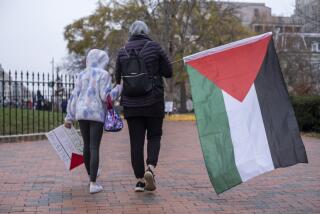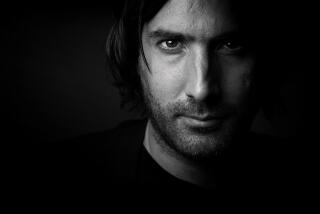THE HOUSE OF THE PROPHETS <i> by Nicholas Saudray; translated by Julia Allen (Doubleday: $15.95; 253 pp.)</i>
- Share via
“What it is to be a Christian in a Muslim Country. . . .”
In this extraordinarily poetic and intricately textured political novel, Nicholas Saudray dramatizes the explosion of religious fundamentalism in the Middle East through the predicament of a young Christian architect. Gabriel returns to his country “Marsania” after studying in the United States in order to enter a government-sponsored competition for the erection of a mosque--a “House” of the four prophets of Islam: Moses, Abraham, Jesus and Mohammed. Because Gabriel is a Mozarab, an Arab Christian, he encounters political and religious obstacles that he is determined to overcome because he believes his mosque to be symbolic of the alliance of Christians, Muslims and other minorities who have co-existed for 13 centuries in the Arab world.
His tolerance of his sister’s marriage to Ruwan, a childhood friend and a leader of an increasingly powerful Islamic fundamentalist sect, reinforces his yearnings for this alliance. The vaulted alleys, the earthen churches, the mountains and the sea of Marsania echo his quest. He wanders in and out of relationships that evoke it: a love affair with the Durrellian Safia, a Jew; a liaison with the Felliniesque Timsit, a young girl from the dissident Islamic mountain tribes, the Nussairis; and a betrothal to Eudoxia, a wealthy Christian girl from his own Mozarab community. These alliances, as euphoric as his vision, come too late. A Christian architect may not build a mosque. In despair, Gabriel makes a gift of his plans to a Muslim architect.
Gabriel, like Camus’ Mersault, is a stranger. “I refuse to take sides,” he tells us as he watches his vision disintegrate in the hands of Islamic fanatics. He is also a stranger to the passions and hatreds that would make him a participant in this Arab tragedy. It is difficult to believe in his Arabness because Gabriel comes across as an outsider, able to see both sides. It is his cousin Mark who acts as an Arab would and attempts to kill Ruwan, thus vindicating the family and the community.
And yet, in spite of, or perhaps because of Gabriel’s Western consciousness and detachment, Saudray has given us an elegiac, haunting work of art about the erosion of religious tolerance in the Arab world.
More to Read
Sign up for our Book Club newsletter
Get the latest news, events and more from the Los Angeles Times Book Club, and help us get L.A. reading and talking.
You may occasionally receive promotional content from the Los Angeles Times.









